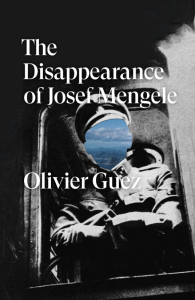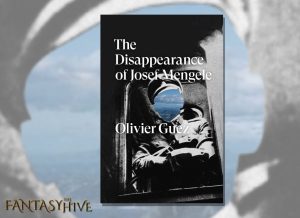The Disappearance of Josef Mengele by Olivier Guez (BOOK REVIEW)
“This is the story of an unscrupulous man with a small, hard soul struck down by a poisonous and deadly ideology that spread through a society weakened by the disruptions of modernity. The ambitious young doctor offered no resistance to the disease of Nazism: it preyed on his mediocre tastes, his vanity, envy and avarice, inciting him to commit monstrous crimes and to justify them. Every two or three generations, as memory fades and the last witnesses of past massacres disappear, reason is eclipsed and men return to propagate evil.”
If one had to rank the most despicable Nazis, surely Josef Mengele, the Angel of Death mass murderer who performed sadistic experiments on his victims at Auschwitz has to be one of the most odious. Yet this horrendous excuse for a human being never stood trial or answered for his war crimes. Mengele escaped to South America where, despite the best efforts of Mossad’s top Nazi-hunters, he lived free to die an old man in 1979. Mengele’s years after the end of the war are shrouded in mystery, fuelled by legend and works of fiction like Ira Levin’s The Boys From Brazil (1976), which imagined him living large in South America and building an army of Hitler clones. Olivier Guez’s The Disappearance of Josef Mengele is a narrative nonfiction novel that makes use of Guez’s meticulous research into Mengele’s missing years to trace his movements across South America on the run from Mossad agents. You could think of it as a work of science fiction, except the “science” in this case is not the hard science of physics, chemistry and biology, but historical research. Guez digs deep into the historical contexts of the 20th century that allowed Mengele to make his escape, and the horrendous beliefs and ideology that made the man such a monster. As such The Disappearance of Josef Mengele is a harrowing journey through the worst horrors of the 20th century, a disturbing but necessary exorcism of the evils of Nazism and the only way left to us to bring Mengele to some kind of account for his horrendous actions.
 The book opens in 1945, the end of World War II, with Mengele arriving in Argentina with false papers. One of the most disturbing aspects of the book is the sheer complicity of so many people in helping Nazi war criminals escape justice. The Mengele family were prosperous owners of a business making and selling agricultural machinery, and they continued to support the war criminal and aid and abet his escapes for his whole life. An entire network of Germans still committed to fascism and Nazism, and their supporters in South America, notably Argentinian president Perón and his celebrity wife Evita, actively helped Nazi war criminals, including Mengele and Adolf Eichmann, the architect of the Holocaust, to escape to Argentina where they were welcomed with open arms by the political elites. The first part of the book is called ‘The Pasha’, and Guez accounts Mengele’s years in Buenos Aires and later Paraguay, living in exile from Germany but in wealth and comfort, surrounded by sycophants and invited to all of Perón’s best parties, eventually marrying his dead brother’s widow.
The book opens in 1945, the end of World War II, with Mengele arriving in Argentina with false papers. One of the most disturbing aspects of the book is the sheer complicity of so many people in helping Nazi war criminals escape justice. The Mengele family were prosperous owners of a business making and selling agricultural machinery, and they continued to support the war criminal and aid and abet his escapes for his whole life. An entire network of Germans still committed to fascism and Nazism, and their supporters in South America, notably Argentinian president Perón and his celebrity wife Evita, actively helped Nazi war criminals, including Mengele and Adolf Eichmann, the architect of the Holocaust, to escape to Argentina where they were welcomed with open arms by the political elites. The first part of the book is called ‘The Pasha’, and Guez accounts Mengele’s years in Buenos Aires and later Paraguay, living in exile from Germany but in wealth and comfort, surrounded by sycophants and invited to all of Perón’s best parties, eventually marrying his dead brother’s widow.
Things start to go downhill for Mengele in the second half of the book. In 1960, Adolf Eichmann, also living in exile in Buenos Aires and moving in the same circles as Mengele, was captured by Mossad agents and put to trial, and Eichmann’s highly media-covered trial brought to light many of the horrors of the Holocaust and the concentration camps which were previously shrouded in rumour for many. Mengele’s crimes were suddenly out in the open, and following their success in bringing Eichmann to justice, Mossad were after him with a vengeance. Guez goes into detail of how remarkable men like Fritz Bauer, the German Jewish judge, Isser Harel, the director of Mossad, and Simon Weisenthal, Holocaust survivor and Nazi-hunter, drew the net around Eichmann and came frustratingly close to capturing Mengele on several occasions. With the collapse of Perón’s regime and increased international scrutiny, Mengele is forced to abandon his wife, friends and life of comfort for life as a fugitive. The second part of the book, called ‘The Rat’, chronicles Mengele’s escape to rural Brazil, where he lives a gratifyingly miserable existence with a family of farmers who despise him, suffers increasingly from ill health and paranoia, and ultimately lives out his final days in the slums of São Paulo, alienated from everyone who knew him and his surviving family, until his anticlimactic death by drowning on the Brazilian seaside. The final part of the novel is a short coda titled ‘The Ghost’, which details how Mengele’s death is eventually discovered, despite his family’s best attempts to keep this a secret.
The book contains two chapters in the middle, following Eichmann’s capture and just before Mengele’s flight to Brazil, that flash back to Mengele’s time in Auschwitz. These chapters are mercifully brief but form an essential hinge for the whole story, showing us a snapshot of the utter horrors of Mengele’s sadistic experiments, his utter disregard for human life and suffering, and the death and despair which he caused so many people. Guez haunts Mengele with recurring nightmares that return him to the scenes of his crimes, followed by the ghosts of his victims calling out for justice. But Guez has delved deep into Mengele’s life and philosophy, and knows that the monstrous man did not feel guilt over the atrocities he committed, only wretched self-pity at the loss of his station and his own suffering as a fugitive. Through the medium of narrative nonfiction, Guez is able to confront Mengele with his horrendous crimes, allowing some measure of catharsis for the reader and for humanity in general, given that Mengele escaped trial and justice in his lifetime. His depiction of Mengele as a truly wretched human being, utterly in thrall to the sickening philosophy of the Nazis and a profoundly broken individual, is utterly convincing, and goes some way to helping us understand how the social and historical context of the time could produce such a remorseless monster. For all his monstrousness, Mengele was a human, a man, and this is what makes him so terrifying. The book ends with a timely warning, that we must never forget the horrors of Nazism or the evil that men are capable of doing. It is a fitting and powerful ending to a disturbing yet morbidly enthralling read.

